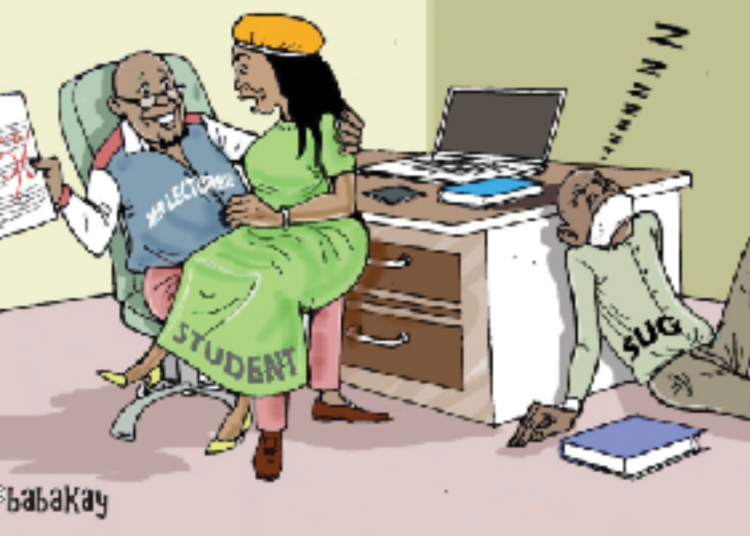Once upon a time we had vibrant, idealistic (as it should be when one is young) students union governments across the country. They held their own elections, funded themselves, organized themselves and served as the corner stone for students’ activities and welfare. They held both university and government authorities to account and were, in many cases ideologically driven. Many landmark moments in Nigeria’s governance history are tied to students’ movements. In 1962 students prevented the federal government from entering into the Anglo-Nigerian Defense Pact. The return of the N2.8 billion naira ‘oil money’ that Fela sings about in Army Arrangement was triggered by students protests in the Seventies. Students protested the Bakolori massacre in Sokoto, the apartheid regime in South Africa and many other instances of government negligence and abuse of power.
Students were the conscience of the country and their premise was that the youth were the landlords of the future and if that future was compromised, then the youth would not arrive at this future. They felt a compulsion and duty towards ensuring that the elders and those taking decisions for the country did not compromise their destiny.
Today, although there are at least 2.1 million students in tertiary institutions around Nigeria, the story is not the same.
Ignoring Sexual Harassment
Professor Cyril Ndifon of Faculty of Law, University of Calabar has been in the news since 2015 for allegations related to sexual harassment of students and a month ago, he was back in the headlines. Each time the sordid details of accusations against him make it into the headlines, gender activists and members of civil society rally round the students and families and this time has not been any different. Press releases and statements in condemnation of the situation and, offers for legal support and safe havens for the survivors have been made but one group has been conspicuously silent: the students union government.
Our universities today have many complicated and intersecting challenges but the scourge of sexual harassment, captured in BBC’s Sex for Grades documentary in 2019, should ordinarily be something student union governments (SUGs) would want to tackle.
There is no public documentation suggesting that University of Calabar’s SUG has a position on the constant allegations against their lecturers. It could be that they are working behind the scenes and consider making statements counterproductive but the silence is worrying and if not driven by tactical thinking, it is telling about some of what we have lost in Nigeria.
While the current SUG is new, elected June 2023 and sworn in a month after, the president and other elected officials are unlikely to be a first-year students and as such have the history of these allegations. Sexual harassment ruins lives – asides the trauma of abuse, sometimes survivors have to drop out of school with long term ramifications for their mental, economic and social well-being. A 2018 World Bank report on Sexual Assault and Sexual Harassment in Tertiary Education Institutions, quoted Owoaje, E. T., & Olusola-Taiwo, O whose study revealed that 70 percent of female graduates’ from a sample of institutions in Nigeria had been harassed by lecturers and/or classmates.
Why Aren’t SUGs Engaged?
The main reason is our SUGs, where they exist, are shadows of what they used to be. In many institutions they are banned and when they have not been proscribed, their elections are compromised to ensure the authorities have malleable students who will do their bidding. In some cases, caretaker officials are appointed – modelling the actions of state governors in ensuring control over local governments. Once students serve at the pleasure of a school administration, they act as agents of the authorities, instead of representatives of the students. The benefit of this compromise of the vibrancy of SUGs which started in earnest when Ibrahim Babangida was Head of State, is that Vice Chancellors get a peaceful tenure largely unbothered by students demands while the quality of students’ lives deteriorates.
If we still had SUGs with a philosophy of care for each other and responsibility for the future of Nigeria, addressing sexual harassment and violence in universities would be a priority. Our SUGs would also be at the vanguard of advocating for better regulation and processes within schools to educate on, prevent, report and manage sexual harassment and violence. The Sexual Harassment in Tertiary Institutions Prohibition Bill 2019 has been in the National Assembly since 2016 and has still not been passed into law. While there are aspects of the bill that are concerning, the lack of support for it by Academic Staff Union of Universities should galvanize students to take ownership of it.
There is a lot going on within our universities; corruption, lack of teaching and learning resources, homelessness, strikes, increase in fees that are already insufficient to close the funding gap and this is compounded by general social, economic and political challenges that Nigerians contend with. As such, it might be insensitive, unrealistic to expect students to bear the burden of securing the future – but it is still their future to protect more than it is the future of those currently at the helm of government affairs.
All May Not Be Lost
In spite of the challenges, and maybe because of them, there are still pockets of light and intellectual resistance within our universities. University of Ibadan’s Thursday Film Series is one example – and the story is beautifully and hauntingly told by Alain Kassanda in Coconut Head Generation. The debates, passion, brilliance, perceptiveness, complexity of positions, and knowledge are inspiring – these are young people on whom youth is not wasted. There are many more like them, unsung, unnoticed but there. They are not of ballot box snatching ilk neither will they scale fences nor soak themselves in obsequiousness – these are the kinds of minds that should be leading SUGs.
What ails Nigerian politics and governance is what ails our students union. Maybe the healing dose for students will be taking a stand against sexual harassment and exploitation in universities – it combines equal parts altruism and charity and could be the beginning of the journey to regain and surpass the glory of students as our leading lights.





